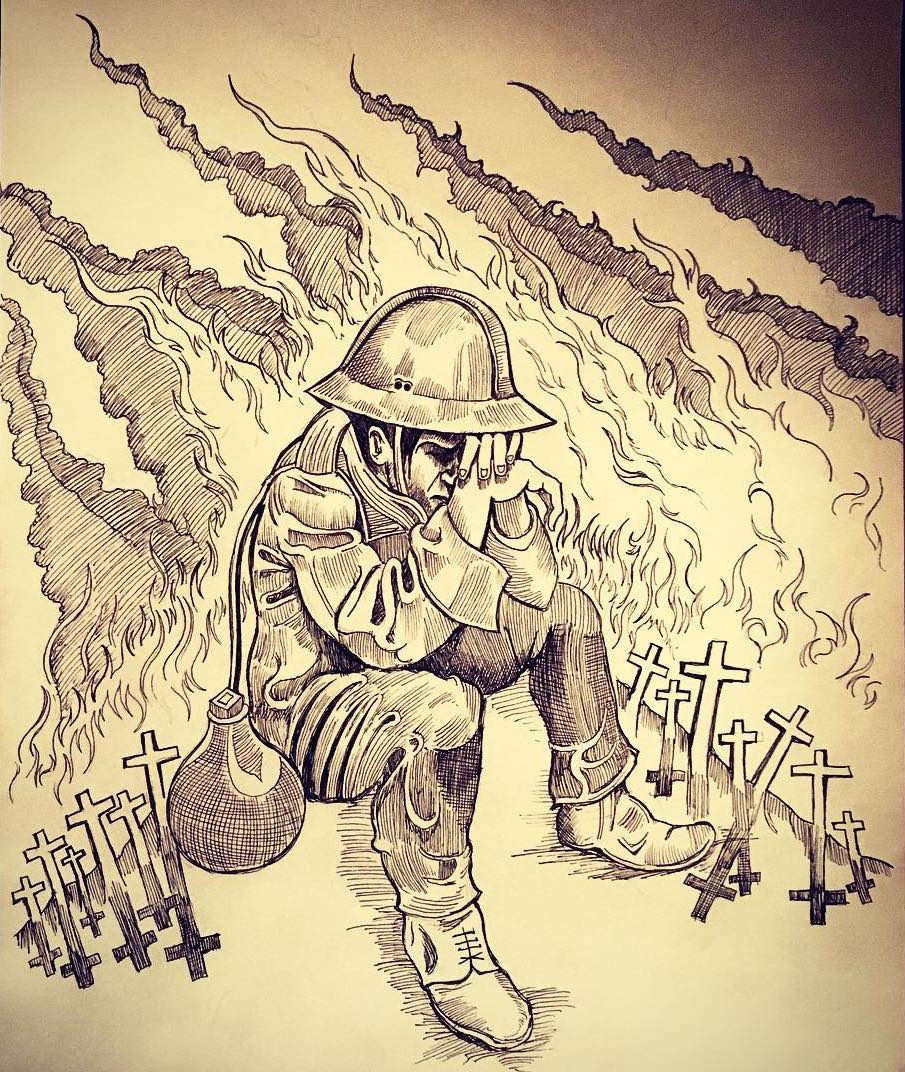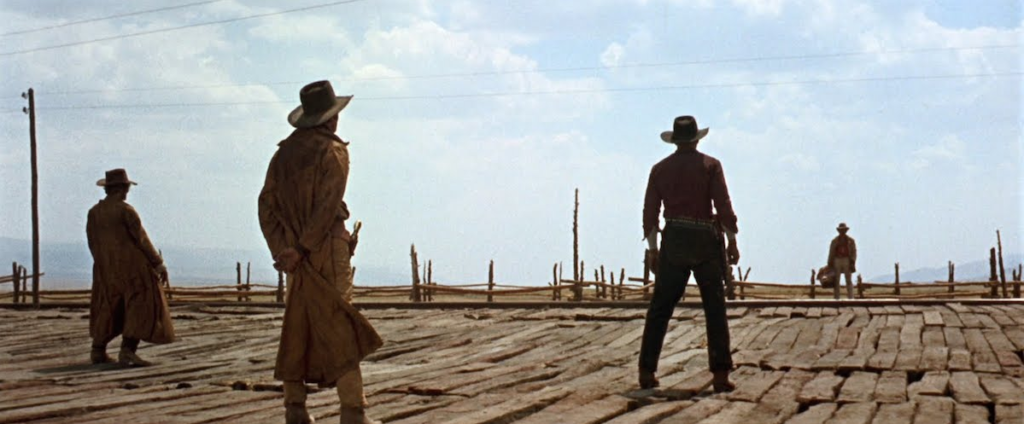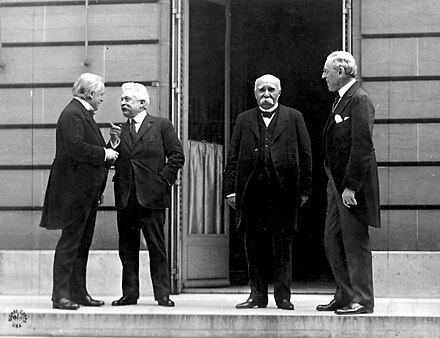The Wiemar Years Part III – Timeline up to the Armistice
Editor’s Note: This is part three of the series composed by our good friend Sulla.
1918
January
- The Russian October/November Revolution has brought Bolsheviks to power in Russia, and within two months there are strikes at German munitions factories organized by the Revolutionary Shop Stewards. They are almost certainly funded and supported by the Russian Bolsheviks.
- Woodrow Wilson gives his “14 Points” speech, which promises a fair and just peace for the German people. Copies of the speech are dropped as leaflets onto German territory as propaganda.
February
- The MSPD begins publishing anti-Bolshevik articles, pointing out the Bolsheviks relied on violence and terror even more brutal than the Czar. The split between the center-nationlist-left MSPD and the Marxist, Bolshevik-supported USPD/Spartacus/Revolutionary Shop Stewards widens.
March 3
- The Bolshevik government in Russia agrees to the Treaty of Brest-Litovsk to end the war with Germany. Germany redeploys troops from the Eastern Front to the Western Front.
March – July
- Germany launches the Spring Offensive in an effort to win the war before Americans can arrive in large numbers. The offensive fails, gaining ground but not defeating the Allies, and leaving German lines overextended.
August
- With fresh American units, the Allied Hundred Days Offensive begins, driving the German Army back.
September 29 (things start to accelerate)
- Gen Ludendorff (Quartermaster General) tells the Kaiser he cannot guarantee that he can hold the front another 24 hours, and that Germany must seek an armistice. The Army and Kaiser agree to submit a request for an armistice to the Americans and that it should be based on Wilson’s 14 Points.
- Ludendorff is worried that the public announcement of seeking an armistice might trigger a socialist revolution. He suggests that to ward this off, they use a “revolution from above”, with the Kaiser quickly democratizing the government. He also thinks a democratic government will get a better peace deal from the Allies.
- Chancellor Hertling is informed of the plans to seek an armistice and conduct reforms. He refuses to be a part of introducing a parliamentary system to Germany and resigns.
September 30
- The Kaiser decides the new government must be formed immediately. He announces Hertling’s resignation and that he will be reforming the government.
October 2
- German High Command presents the grim situation to the political leaders in the Reichstag. The party leaders are shocked, having believed the propaganda of Hindenburg and Ludendorff that the Army was winning.
October 3
- The Kaiser appoints Prince Max as Chancellor to replace Hertling. Prince Max forms a new coalition government with MSPD, Zentrum, and FVP.
October 4
- Prince Max officially requests a truce with the Allies on behalf of the German government, sending a telegram to Woodrow Wilson, saying the German government accepts the 14 Points as the basis of a negotiated truce.
October 5
- The German public is told the situation is dire.
October 8
- Wilson’s reply is received by Prince Max. It is polite and conciliatory, affirming the 14 Points but also saying German troops must be withdrawn from occupied territories immediately. However, Wilson sent it without consulting with Britain or France.
October 12
- Prince Max telegrams Wilson accepting Wilson’s provisions and agreeing that German troops would be withdrawn from occupied lands.
October 14
- Wilson replies with a much less conciliatory tone this time, demanding the immediate halt of submarine warfare, and strongly hinting that the Kaiser would need to abdicate for the peace talks to move forward.
October 17
- Prince Max holds a meeting with political leaders and the military staff to discuss Wilson’s new demand. Admiral Scheer opposes ending submarine warfare. Ludendorff says Wilson’s demands should be rejected. All the political leaders say it is too late to stop armistice negotiations and that the military should stay out of political decisions.
October 20
- Prince Max’s new response to Wilson is sent, agreeing to all the demands. He points out that fundamental constitutional changes have already happened and that the government is now led by the Reichstag.
October 23
- Karl Liebknecht is released from prison. He immediately begins speaking at anti-war rallies, calling for the abdication of the Kaiser, the creation of a dictatorship of the proletariat, the end of capitalism, and the establishment of a worker’s republic. And all the other Marxist nonsense one would expect.
October 24 (Buckle up, Buttercup, the ride really starts going here)
- Wilson sets as an explicit condition for a negotiated truce that the Kaiser must abdicate.
- Hindenburg circulates a memo through the armed forces claiming Wilson is demanding unconditional surrender, and that it is unacceptable to “us soldiers.”
- Prince Max is confined to bed with the Spanish Flu. His deputy meets with Ludendorff, who angrily rants that that negotiations must be called off. When Prince Max receives a report of this, he decides that Ludendorff must be relieved of his command. Prince Max tells the Kaiser that Hindenburg may remain, but Ludendorff must be sacked or Prince Max himself will resign.
- Admirals Scheer and Hipper issue an order – apparently a rogue one without authorization from Berlin – for the High Seas Fleet to sortie in an attempt to inflict as much damage as possible on the British Grand Fleet. The mission is obviously a suicidal one. The sailing date is set as the night of October 29-30.
October 26
- Ludendorff is sacked as Quartermaster General by the Kaiser.
October 28
- The Reichstag passes legislation to convert Imperial Germany into a parliamentary monarchy, making the Chancellor report to parliament instead of to the Kaiser. The Kaiser signs the legislation, officially ending autocratic rule in the German Reich.
October 29
- General Groener is appointed as Quartermaster General, replacing Ludendorff.
- A naval mutiny among sailors in the High Seas Fleet unwilling to go on the suicide mission begins in Wilhelmshaven and Kiel. The sortie is canceled.
- The Kaiser suddenly leaves Berlin for Imperial HQ in Spa, Belgium.
November 1
- The Kaiser refuses to abdicate. Both Hindenburg and Groener express support for the Kaiser.
November 2
- Emil Barth (of the Revolutionary Shop Stewards) calls a meeting of all the revolutionary organizations – the Shop Stewards, the Spartacus League and member of the USPD. Barth proposes an armed revolution should start on the 4th. Liebknecht speaks against it, preferring strikes and industrial sabotage instead. Barth’s proposal is narrowly rejected.
- Sailors in Kiel hold a meeting on a parade ground in the city and demand the release of sailors jailed as part of the mutiny. The sailors are led by a member of the USPD.
- The King of Bavaria – Ludwig III – approves a series of democratic reforms transferring lawmaking authority from the King to the Bavarian parliament.
November 3
- Sailors joined by industrial workers in Kiel (about 6,000 total, again with support from the USPD) march towards a beer hall being used as a temporary prison holding the incarcerated mutineers. The guards fire on the march, killing 7 people and wounding 29 more.
November 4
- Rebels in Kiel roam through the city capturing buildings and detaining naval officers. 40,000 rebels form “councils” (the German equivalent of the Russian “soviets”) and elect leaders. The Revolutionary Shop Stewards calls for a general strike in Kiel starting the next day. Many of the Army troops sent to Kiel to quell the protests instead join in.
November 5
- Sailors from Kiel are traveling to other cities to spread the uprising.
- The Allies agree to truce negotiations
November 6
- MSDP holds a crisis meeting. Ebert agrees to meet with Prince Max to discuss the Kaiser’s abdication.
- Russian ambassador and his staff are expelled from Germany for inciting revolution.
- German cease-fire commission leaves Berlin for France on the orders of Prince Max.
November 7
- Ebert meets with Prince Max, and tells him that if the Kaiser does not abdicate, a socialist revolution – which Ebert does not want (“I hate it like sin,” he says) – will be unavoidable. Prince Max agrees to travel to Spa and convince the Kaiser to abdicate.
- German cease-fire delegation arrives at Imperial German HQ in Spa, Belgium. Meets with the Kaiser and Hindenburg. At noon, the delegation leaves Spa and sets out to cross the lines into France. By evening, they reach the HQ of the French 1st Army and, after being served dinner, are put on a train, whose destination they do not know.
- The naval revolution has grown and taken control of most large coastal cities, and is now spreading inland.
- An anti-war demonstration of 60,000 people is held in Munich (capital of Bavaria), again led by USPD members, in particular Kurt Eisner (“born to a middle class Jewish family in Berlin…”). Eisner had been convicted earlier in the year of treason for leading a strike of munitions workers, but was released in October as part of a general amnesty movement. Eisner and his followers “liberate” the military garrisons (I assume this means, took weapons from them) and is not opposed by any of the troops. At 9pm, Eisner declares Bavaria a republic and with his gang occupies the Bavarian parliament.
November 8
- Kurt Eisner “establishes” a provisional Bavarian government with himself as Minister-President and Foreign-Minister. The Wittelsbach dynasty, which has ruled Bavaria since the 11th Century, comes to an end.
- General Groener summons 50 of his front-line commanders to a meeting in Spa. Hindenburg addresses them and says the Kaiser wants to march on Berlin to put down the socialist uprising. He asks them if their troops will support it. Only one commander believes his men will go along. Hindenburg and Groener then meet with the Kaiser and tell him it is hopeless because the Army will not follow the Kaiser.
- The German cease-fire delegation’s train comes to a stop along a station in the forest of Compiégn. Shortly afterwards another train arrives, carrying Ferdinand Foch. The German delegation meets with the French/British (there are no Americans) delegation. Foch dictates the armistice conditions – they are harsh for the Germans, and non-negotiable – and gives the German delegation 72 hours to agree or not.
- Rosa Luxemburg is released from prison.
November 9
- Of the 26 constituent states of the German Empire, the kings, dukes and princes of every one except Wurttemberg and Prussia (a.k.a Kaiser Wilhelm II) have been deposed.
- A strike organized by the Revolutionary Shop Stewards hits Berlin. Soldiers refuse to put down the strike and instead join in.
- Emil Eichhorn, a USPD Reichstag member, leads a group of revolutionaries to occupy the Berlin Police station. The guards do not resist and surrender the building (and their weapons) to Eichhorn and his men. Eichhorn declares himself Chief of the Berlin Police.
- Prince Max, deciding not to travel to Spa, telephones the Kaiser and tries to convince him to abdicate. Wilhelm agrees on the phone to abdicate as Kaiser, but not as King of Prussia, and says he will send a proclamation. A half hour later, having received no further communication from the Kaiser, Prince Max announces that the Kaiser and Crown Prince Wilhelm have renounced all claims to both the German Empire and Prussia. Prince Max then appoints Ebert (of the MSPD) as the new Chancellor.
- The Kaiser is in a rage about being declared abdicated in absentia, but Hindenburg informs him he could not guarantee the Kaiser’s safety, and warns that he could be arrested at any moment by revolutionary troops and taken to Berlin as a criminal. He advises the Kaiser to flee to the Netherlands.
November 10
- Kaiser Wilhelm II departs Spa for the Netherlands, where he will spend the rest of his life in exile.
- Ebert announces the intention to create a new National Assembly, elected by the people, to decide on a new form of government. Ebert wishes to avoid a Bolshevik style government.
- Phillip Scheidemann, Ebert’s deputy, gets wind that the Spartacist Liebknecht is planning to announce a socialist republic, and instead steps out onto a balcony of the Reichstag and proclaims a republic to a large crowd, claiming Ebert has been proclaimed Chancellor and authorized to form a new government that will include all the socialist parties.
- A few hours later, Liebknecht delivers a speech from the Kaiser’s Berlin palace proclaiming a socialist republic run by the proletariat.
- Ebert forms a provisional government from the MSPD and the USPD, the “Council of People’s Deputies” which takes over the powers of the Chancellor, the Bundesrat, and the Reichstag. Holders of existing cabinet posts remain in office, but are expected to follow the orders of the Council. There are six members of the Council: Ebert, Scheidemann, and Otto Landsburg (MSPD), and three from the USPD, including Hugo Haaase and Emil Barth.
- The USPD, Spartacus, and the Revolutionary Shop Stewards meet and approve the “Council of People’s Deputies”, but also elect an “executive committee” of 12 soldiers and 12 shop stewards to be an alternate power center.
- Late in the evening, Ebert receives a phone call on a previously unknown phone line. It is a secret hotline to the Imperial Army HQ. General Groener is on the other end. He is calling to offer a deal. Ebert will receive the loyalty and cooperation of the Army in putting down the Marxist revolution, in exchange for an end to the effort to reform the Army as a People’s Army led by elected deputies from the Soldiers’ Councils.
- In the Compiégn forest, the German delegation receives a radio message from Ebert authorizing them to sign the armistice agreement even if the terms remain harsh.
November 11
- At 5:20 am. The Armistice is signed, going into effect at 11am that day. Nearly 3,000 soldiers are killed between the time it is signed and 11 am, all for the sake of 11/11 at 11am. Bastards.
The war is now officially over, but the aftermath is just beginning.










As I’m reading this, I don’t know how any German knew what the hell was going on in Germany at all.
Yeah, I got that impression, that things were changing so fast, everybody was just unmoored. Especially given the German character trait of respecting authority, having “authority” gyrating wildly around must have been profoundly disturbing to the average German.